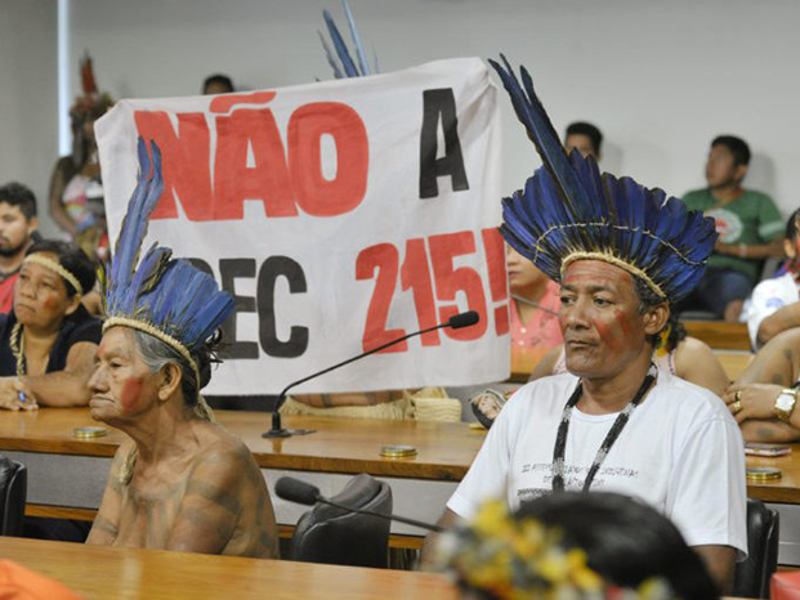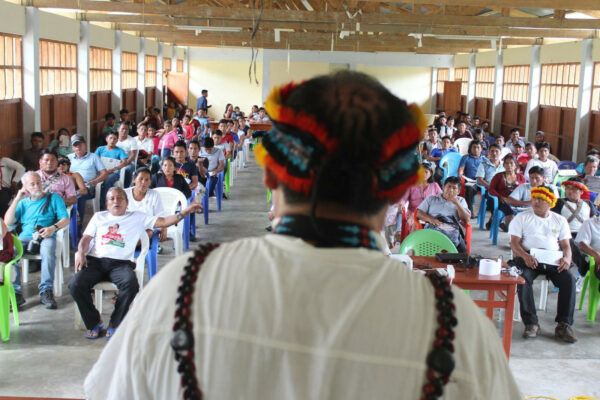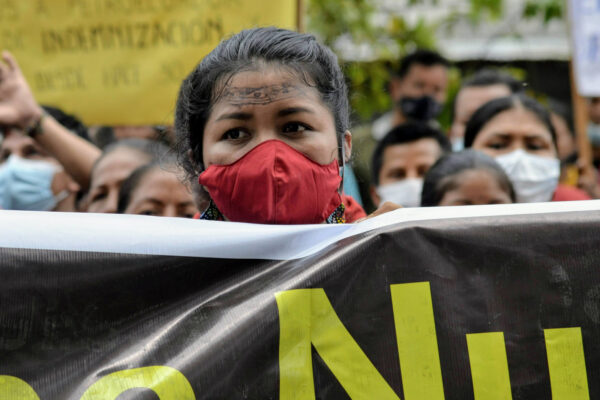
Translated by Mike Gatehouse. Original article in Portuguese here.
When the Imperatriz Leopoldinense samba school published in January its theme for 2017, “Xingu, the cry of the forest,” it was met by a groundswell of hate speech. Rabid attacks on Rio’s people, on Rio itself, and on the Carnival burgeoned on social media and even some television channels. These went far beyond the traditional racism expressed towards the poor and the indigenous.
Anyone planning to enjoy themselves at the Sambodrome was suddenly frightened. For indigenous people, sadly, this is no novelty. It is just another phase of the consistent attacks on our way of life and the rights we gained under the 1988 Constitution.
The law in Brazil enshrines the “original” rights of indigenous peoples over the lands which they traditionally occupied. Known as the “Citizens’ Constitution,” it is held up worldwide as a model for care for the environment and respect for human rights.
Under the inspiration of this law, Brazil made significant international advances, becoming a signatory, for example of ILO Convention 169 and the UN Declaration on Indigenous Peoples, and it won international admiration for recognising more than 110 million hectares of indigenous lands.
PECking away at indigenous rights
However, from the moment of its passage into law, this Constitution has been under ferocious attack by those whom it displeased, as they fired off one constitutional amendment (PEC) after another.
For example, PEC 215 was drawn up to transfer the responsibility for demarcating indigenous land from the executive branch to the legislature, where the Rural Coalition holds today a disproportionate 40 percent of the seats. Imagine what they would leave to indigenous people and to nature.
In 2017, a new attack appeared, this time coming from the Presidency of the Republic: an order on January 18th, published by the Ministry of Justice under the then Minister, Alexandre de Moraes (the same man now nominated by President Temer to fill the vacant seat on the Federal Supreme Court), established a group to review all the indigenous land demarcation processes undertaken by the now much-weakened FUNAI.
The indigenous movement and the Federal Public Ministry protested, and the order was revoked. But another one was published to replace it and the threat remains, since the group it set up remains in existence and decisions taken for political reasons can outweigh the conclusions of technical studies.
Besides, this order opens the way for a whole series of measures which threaten indigenous rights. The most important is the “cut-off point” thesis, which in practice means the we would only have rights to lands that were occupied in October 1988, the date when the Constitution came into effect, even if we had previously been violently expelled from our lands, as had been officially recognised by the Brazilian state in the report of the National Truth Commission.
It is important to clarify: according to the understanding laid down by the Federal Supreme Court, “the rights of indigenous Indians to the lands they traditionally occupy were constitutionally recognised, not simply “given” to them. Therefore the act of demarcation of lands is declarative, not newly constituted, declarative of a pre-existing judicial situation.
“It is for this reason that this ‘Magna Carta’ calls [indigenous peoples] original [inhabitants], as a way of expressing a right which is older than any other, and as a way of making these rights superior to any acquired rights, even those enshrined in public legal documents or titles written to benefit non-Indians.”
Given that, to “review” the demarcation of indigenous lands, as PEC 215 and the new order of the Minister seek to do, is incompatible with the Civil Constitution and a direct attack upon its essence as guarantor of Brazilian democracy itself and the fundamental rights of minority groups and those with less economic and political influence, who cannot be made a target for violations, even if a transitory majority should wish it so.
Killing the goose…
The hate speech which engulfed Imperatriz Leopoldinense follows the logic of suppression of rights by means of closed-door negotiations and agreements signed in secret, which aim to reverse all the gains made by indigenous people in Brazil.
What is worse, this could rebound on them and on the whole country. Indigenous lands constitute a barrier against deforestation, because of the traditional way of life practiced there. There is ten times less deforestation inside indigenous lands than outside them and for that reason they play a vital role in regulating the climate of our planet. And that is good for everyone, including the farmers.
On the other hand, the more deforestation, the worse our climate will become. According to the Institute of Environmental Research in Amazonia (IPAM), the great block of virgin forest which exists within the Xingu Indigenous Park serves as a natural air conditioning plant for production beyond its boundaries, where most of the natural vegetation no longer exists.
The study Economy of Climate Change in Brazil (Margulis, Dubeux and Marcovitch, 2011) shows that the average loss of soy production in the country attributable to climate change could reach 20 percent by 2050. With a loss of 6 billion reais per year.
One third of Amazonia is under our protection. This area stores thirteen billion tons of carbon in the form of forest vegetation. Without that vital support, nothing can survive.
So, here is our warning: to expel the Indians from our lands is to kill the goose that lays the golden eggs here in Brazil. To interfere with the Indians is to remove the constitutional rights for which this country is recognized. And to interfere with the climate is to weaken the economy and worsen the lives of everyone.
Imperatriz Leopoldinense probably had no idea where it would lead them when they chose to speak out about the Xingu, but they chose the right path. Because today, to defend the Brazilian Indian is to defend the future of our country.













